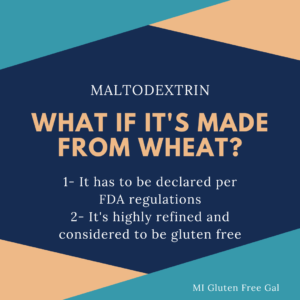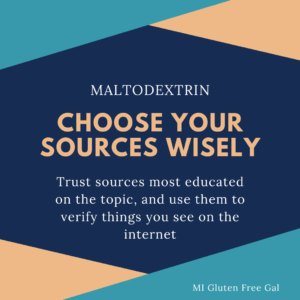Is Maltodextrin Gluten Free?
As an Amazon Associate and member of other affiliate programs, I earn from qualifying purchases.
When you live with Celiac Disease, reading labels for sources of gluten is an important skill. However, some ingredients may lead to confusion. For instance, is maltodextrin gluten free?

Despite the Name, Maltodextrin Does Not Contain Malt
When diagnosed with Celiac Disease, we are taught to read labels for sources of gluten. Sources of gluten contain wheat, rye and barley, and their derivatives. We consistently reference barley malt, as it is often overlooked. However, please know that while the names are similar, maltodextrin and malt are not the same thing.
What is Maltodextrin?
Per Healthline, “Maltodextrin is a white powder made from corn, rice, potato starch, or wheat. Even though it comes from plants, it’s highly processed. To make it, first the starches are cooked, and then acids or enzymes such as heat-stable bacterial alpha-amylase are added to break it down further. The resulting white powder is water-soluble and has a neutral taste.”

Is Maltodextrin Made from Wheat?
Yes, maltodextrin can be made from wheat. (However, it is most frequently made from corn.) Per Gluten Free Watchdog, “Under FALCPA, if an FDA-regulated food product contains maltodextrin and the maltodextrin contains protein derived from wheat, the word wheat must be included on the food label (e.g., maltodextrin (wheat).
If you don’t see the word wheat on the label of an FDA-regulated product containing maltodextrin, the food product does not contain wheat protein as an ingredient.”
Maltodextrin is Highly Refined and Considered Gluten Free
However, even if maltodextrin is made from wheat, it is generally considered safe on a gluten free diet. Per the Gluten Intolerance Group, “Maltodextrin is made through enzymatic hydrolysis using water, enzymes, and acids to break down the starch in the source vegetable or grain. The resulting product is a white powder made up of chains of sugar molecules and no gluten proteins, even when derived from gluten-containing grains.”
Beyond Celiac and the National Celiac Association also state on their respective websites that maltodextrin is considered to be gluten free, even if the grain source is wheat. Allergic Living states maltodextrin as gluten free in their article “Gluten Free or Not? 10 That Can Stump Even the Most Informed.” (Written with Shelley Case, R.D.)
Maltodextrin is One of Many Additives Deemed Gluten Free
Maltodextrin is among many food additives which are considered gluten free. The National Celiac Association article, “Ingredients People Question on a Gluten Free Diet includes a table of multiple additives people ask about.

Choose Your Sources Wisely
A WebMD article on maltodextrin states, “If you have celiac disease, be careful about eating foods with maltodextrin. The powder has traces of gluten if its source is wheat.” Listen, I’ve used WebMd in the past. However, I think of WebMD like a primary care physician. They know a little about a lot. For Celiac Disease information, I prefer sites that specialize in my disease.
Verify Facts that Make You Anxious/ Afraid
Reading food labels can be very intimidating. When you’re trying to keep you and your family safe, you want to be informed. However, I want to caution us when we see something on social media that immediately makes us afraid. Before you make a knee jerk reaction, check with other trusted resources to verify that information.
Also, as I’ve mentioned previously in my article about navigating the internet, be cautious of accounts that may play on your emotions. Posts that intentionally cause anxiety and fear tend to get higher engagement because of immediate shares. Be informed, but don’t allow yourself to be manipulated.
What other ingredients have you been baffled by? Leave me a note in the comments.

As always, thanks for the information and helpful tips!
You’re welcome! Glad I can help provide more information on a complex topic.
Such an interesting read! I always thought that we had to stay away from maltodextrin! Now I am more informed! I still consider myself a newbie to the GF diet even though it has been 6 years. So thank you for the information and keep up the excellent work!
Ive been diagnosed for over 20 years, and I still learn new things sometimes. 🙂